agree with,agree to,agree on的区别.doc
agree的用法及解释

agree的用法及解释对于agree的用法,常常被很多人忽略,其实对初学者来说,agree是一个常见的词汇,它的用法有很多,那么你了解多少呢?下面是小编给大家带来的agree的用法及解释_agree的六个用法总结,以供大家参考,我们一起来看看吧!agree的解释v. 同意; 赞成; (对…) 取得一致意见,一致同意; 应允; 答应;[例句]If we agreed all the time it would be a bit boring, wouldn't it?如果我们总是意见一致,就会有点无趣,对吗?[其他] 第三人称单数:agrees 现在分词:agreeing 过去式:agreed 过去分词:agreedagree to,agree with,agree on,agree about的用法区别.1.agree (to sth) 意为“同意;愿意;答应(某事物)”.如:Is he going to agree to our suggestion?他会同意我们的建议吗?2.agree with sb 意为“适合(某人的健康或胃口)”,尤用于否定句或疑问句中.如:The climate there doesn\'t agree with him.那里的气候对他不合适.3.agree (with sb) (about / on sth) 意为“同意;(与某人)意见一致”.如:We couldn\'t agree on a date/ when to meet.关于日期(什么时候见面),我们没有能取得一致意见.4.agree sth意为“在某事物上取得一致意见;商定”.如:Can we agree a price?我们能不能商定一个价格?5.agree (with sth) 意为“与(某事物)相一致;相符合;相吻合”.如:Your thoughts didn\'t agree with mine.你的想法和我的想法不一致.6.be agreed(on /about sth)意为“达成协议;意见一致”.如:We are all agreed on the best action.我们都同意这一最佳措施.7.agree后面还可以接宾语从句,即be agreed that ...如:It was agreed that another meeting was necessary.大家都认为有必要再开一次会.agree的六个用法agree一般与with连用,agree with sb.,表示同意某人的观点agree vt. & vi. 基本用法如下1)单独使用,表示同意、答应等。
9A上海牛津英语-U5

Unit 5 The human brainMemoryⅠ.Words1. agree vi. 同意He agrees with me. 他同意我的意见。
【指点迷津】agree with, agree to, agree on(1) agree wit表示“同意…适合…”,后面一般接人作宾语。
I said that she’d better finish the work first. But she didn’t agree with me.我说她最好先完成工作,但她不同意我的话。
(2) agree to也表示“同意…”,但气候一般接办法、计划、提议或某件事作宾语。
We agreed to the plan. 我们同意那个计划。
(3) agree on表示“双方就…达成协议,取得一致意见”We agreed on the question. 我们就这个问题取得了一致意见。
2. enjure v. hurt; damage 损害,伤害There were two people injured in the car accident. 又两个人在车祸中受了伤。
She was injured badly in an accident during the work. 她在一次工伤事故中受了伤。
【指点迷津】injure, hurt, harm, damage, wound, destroy(1) injure vt. 损害,伤害,毁坏,指在事故中受到的意外伤害或情感、名誉上的伤害。
Don’t injure his pride (reputation).不要伤害他的自尊心(名誉)。
(2) hurt vt. & vi. 使受伤痛,损害,危害,指肉体或精神上的伤害、创伤,强调伤害造成的痛苦。
It hurts your eyes to read in bed. 在床上看书对眼睛有害。
(3) harm n. & vt. 伤害,损害,危害,指对人或事物的危害。
高中英语 知识点大全6 alive living live lively的区别
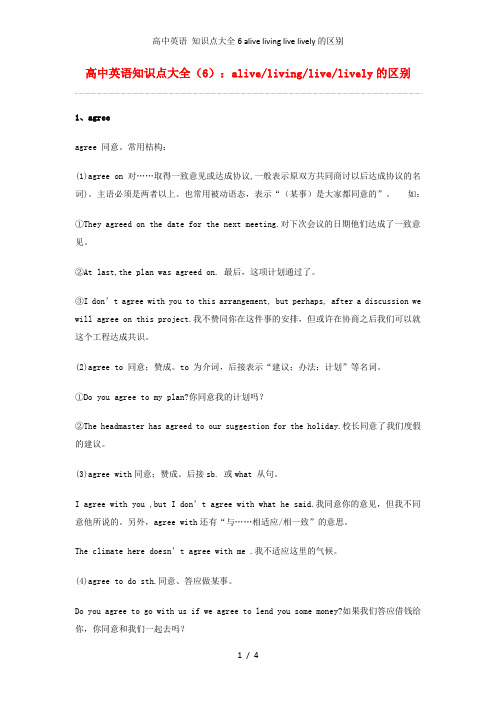
3)living 意为“活着的、有生命的”,主要用于作前置定语及冠词the 之后表示一类人,也可用作表语,可修饰人或物。如:
a living plant 活的植物 all living things 所有生物 the living 在世者,活着的人们
(2)agree to 同意;赞成。to 为介词,后接表示“建议;办法;计划”等名词。
①Do you agree to my plan?你同意我的计划吗?
②The headmaster has agreed to our suggestion for the holiday.校长同意了我们度假的建议。
adv.仍然,还是
Thank you all the same.
all the year round 全年,一年到头
In the west oast of Canada,it rains all the year round.
4)live [laiv]
(1)(动、植物)“活的”,“有生命的”,“活生生的,主要用来说鸟或其它动物,作前置定语;如:a live fish一条活鱼 a live tiger 一只活老虎
(2)实况的,现场直播的;如:a live report现场报道 a live show/broadcast/TV program现场转播的表演/实况广播/现场直播的电视节目 living有精神的,活泼的,快活的,轻快的
②At last,the plan was agreed on.最后,这项计划通过了。
③I don’t agree with you to this arrangement, but perhaps, after a discussion we will agree on this project.我不赞同你在这件事的安排,但或许在协商之后我们可以就这个工程达成共识。
英语同义词辨析总复习

英语同义词辨析总复习初中英语常用词词义及用法辨析1、about, onabout与on都可以作"关于"讲,但on是表示关于学术性的问题,例如:This book is about physics. 这是一本关于物理学的科普读物。
This book is on physics. 这是一本物理学方面的专著。
2、after, in当你要表达在一段时间内某个动作可以完成时,一定要用in,而不能用after,因为after是指在某一时间之后。
例如:This work will be done in two days. 即表明在两天内这一工作一定会做完。
而如用了after,即表示在两天之后,完成的时间是不确定的。
另外:in two days 用于一般将来时two days later 用于一般过去时3、agree with/ agree on/ agree to(1)agree with(sb.)表示“与……意见一致”。
I d on’t agree with you. 我不同意你的意见。
(2)agree to(sth.)宾语一般为suggestion、plan等,“同意计划、安排”。
We all agreed to your plan. 我们同意你的计划。
(3)agree on 表示“双方就...达成一致协议”。
China and the U.S.A. agreed on the place and time for the next meeting. 中美双方就下次会议的时间、地点问题达成了协议。
4、 a bit/ a little二者都有“一点儿”的意思,(1)相同点:都用来修饰形容词、副词原级及其比较级,也可修饰动词。
Get up a bit/ a little earlier, and you will see the star.起早一点你就会看到星星了。
(2)不同点:①a little+不可数名词,a bit of+不可数名词He ate a little food/ a bit of food this morning.他今天早上吃了一点食物。
2019外研版高中英语选择性必修一Unit2 易混易错点辨析

Unit2 易混易错点辨析●seem; appear【教材原句】When the road you’re trudging seems all uphill,….. (教材P13)Don’t give up though the pace seems slow—you may succeed with another blow. (教材P13)So, it seems that talent alone isn’t enough to guarantee success. (教材P15)【辨析】两者都有“看起来(好像、似乎…)”的意思,一般可以换用,但在个别殊结构用上的用法上有一定的区别。
seem侧重指根据某种迹象作出的推断,也不一定是事实,常用于以下机构中:①seem + n/adj. 似乎/好像….②seem to be/to do sth. 好像是/做某事③it seems that从句好像….④seem like…..看起来像….⑤it seems as if/though…..看起来好像…….⑥there seem to be….好像有…..appear强调自身表现出, 流露出;appear 指外表给人的印象,可能是真象也可能是假象,不确定性更大一些,常用于以下结构或词组中:① appear + n/adj. 似乎/好像…..② appear to be/to do sth. 好像是/做某事③ it appears that从句好像….④what appears to be…看起来像….的东西⑤there appears to be…. 似乎/好像有……⑥ appear out of nowhere 突然冒出来⑦ appear overnight 一夜之间出现(反义:disappear overnight)温馨提示:①在seem like…. 和it seems as if/though…..结构中,一般不能换成appear②appear 表示“出现”时,不可与seem 换用【例句呈现】One day a stranger appeared on my doorstep.一天,一个陌生人出现在我家门前。
agreeon,to,with的用法差异

agreeon,to,with的⽤法差异1. agree on两⽅或多⽅就某事取得⼀致意见或达成协议Let’s try to agree on an approach to the problem.让我们设法就解决这个问题的⽅法取得⼀致意见。
You and I agree on this point. 你和我在这⼀点上上是⼀致的。
We all agreed on the terms. 我们⼤家第这些条件取得了⼀致意见。
I met the new manager today and found that we agreed on basic policies.今天我见到了新经理,发现我们在基本政策撒花姑娘意见是⼀致的。
We agreed on a date for the next meeting. 我们就下次会议的⽇期达成了协议。
2. agree to sth接受,认可(常常指并⾮出于主观愿望的“同意”)agree on指双⽅或多⽅“在…⽅⾯取得⼀致意见,”或”在…⽅⾯达成⾮正式协议”。
At last his wife agreed to the trip if he allowed her to go also.3. agree with指出⾃主观愿望的“赞成、同意”She agreed with this idea. 她赞成这个主意。
I don’t agree with a single word that you have said. 你所说的每句话我都不赞成。
I agree with his views. 我同意他的观点。
agree to是指“接受、认可”,常常指并⾮主观愿望的“同意”。
agree to尤指不乐意或争论之后的同意(to accept an idea, opinion, etc., esp after unwillingness or argument)。
你可能agree to⼀个政策,然⽽并不⼀定agree with它。
初中英语常用词语辨析大全
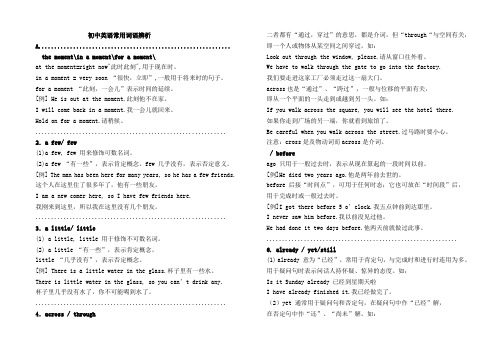
初中英语常用词语辨析A.............................................................the moment\in a moment\for a moment\at the moment=right now"此时此刻",用于现在时。
in a moment = very soon “很快,立即”,一般用于将来时的句子。
for a moment “此刻,一会儿”表示时间的延续。
[例] He is out at the moment.此刻他不在家。
I will come back in a moment.我一会儿就回来。
Hold on for a moment.请稍候。
............................................................. 2.a few/ few(1)a few, few 用来修饰可数名词。
(2)a few “有一些”,表示肯定概念,few 几乎没有,表示否定意义。
[例] The man has been here for many years, so he has a few friends. 这个人在这里住了很多年了,他有一些朋友。
I am a new comer here, so I have few friends here.我刚来到这里,所以我在这里没有几个朋友。
............................................................. 3.a little/ little(1) a little, little 用于修饰不可数名词。
(2) a little “有一些”,表示肯定概念。
little “几乎没有”,表示否定概念。
[例] There is a little water in the glass.杯子里有一些水。
初中英语常用词语辨析大全
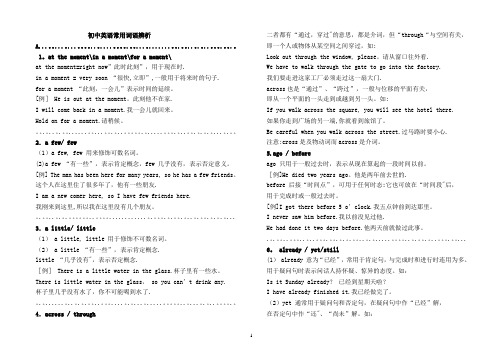
初中英语常用词语辨析A...。
...。
...。
..。
....。
.。
...。
.......。
.。
..。
.。
..。
.。
.。
1。
at the moment\in a moment\for a moment\at the moment=right now”此时此刻”,用于现在时.in a moment = very soon “很快,立即”,一般用于将来时的句子.for a moment “此刻,一会儿”表示时间的延续。
[例] He is out at the moment。
此刻他不在家.I will come back in a moment.我一会儿就回来。
Hold on for a moment.请稍候。
.。
..。
.。
......。
...。
.。
..。
.。
.....。
.。
..。
.。
.。
.。
...。
.。
2.a few/ few(1)a few, few 用来修饰可数名词。
(2)a few “有一些”,表示肯定概念,few 几乎没有,表示否定意义。
[例] The man has been here for many years, so he has a few friends。
这个人在这里住了很多年了,他有一些朋友.I am a new comer here, so I have few friends here.我刚来到这里,所以我在这里没有几个朋友。
.。
..。
.。
.。
..。
............。
.。
.。
.。
.。
..。
.。
.。
.。
.。
... 3.a little/ little(1) a little, little 用于修饰不可数名词。
(2) a little “有一些”,表示肯定概念.little “几乎没有",表示否定概念.[例] There is a little water in the glass.杯子里有一些水。
There is little water in the glass, so you can’t drink any.杯子里几乎没有水了,你不可能喝到水了. 。
英语短语

[思路分析]这个问题设计的范围很广,很难全面回答,所以只能说一部分。
[解题过程]1 形容词排列顺序:一般的顺序是限定词(the,a)或数词+描绘性adj.+大小+形状+时间或年龄+颜色+国籍或来源+材料+目的+名词agree这道题目考查关于agree的几个词组这里要特别注意区别 agree to, agree on, agree with三个词组这道题目的答案应该是A to 注意,这里的to是介词,而不是不定式1 agree to的意思是“同意”、“应允”,它专用于对事,不用于对人,其后接事物名词。
在这里要注意区别agree to sth和agree to do sth,前面一个是本题中的词组,后面一个是不定式。
2 agree on:对…意见一致例句:We agree on this plan.我们在这个计划上意见一致。
3 agree with,首先有agree with sb/one's opinion/what one says……:同意某人的话例句:I agree with you 我同意你的话、看法、意见。
此外,agree with还有一致、相符合的意思例句:what he said didn`t agree with the fact.他所说的和事实不符合hanghang一般的意思是:悬挂、挂它也有一个比较特殊的意思:绞死、吊死[解题过程]当表示一般意思的“挂、悬挂”时,用hang,hung,hung如果表示“吊死、绞死”这个意思,则用hang,hanged,hanged1.a bit, a little【分析比较】a little与a bit 都有“一点儿,有点儿”的意思,可以修饰形容词、副词等,意思相近。
在修饰名词时,a littler后面可直接接不可数名词,而a bit后面须加上of,再接不可数名词。
另外,not a little相当于much,而not a bit 则相当于not at all (一点不)。
词义辨析

1、a number of, the number ofa number of +可数名词,谓语用复数,意为许多,大量的……the number of +可数名词,谓语用单数,意为……的数目2、able, capable, competentAble 指做某事所需的力量,技巧,知识与时间等,搭配是be able to do s.th capable 指满足一般要求的能力,搭配是be capable of +doingcompetent 指“胜任”,“合格”,或受过专业技术等训练的,不是超群的能力3、above all;after all;at all; in allabove all 意为“首先”、“最重要的是”,after all 意为“毕竟”、“到底”,at all 用于否定句时,意为“丝毫;根本”用于疑问句时,意为“究竟;到底”用于条件句时,意为“当真;实在”用于肯定句中,意为“竟然”in all 意为“总共”,4、aboard, abroad, board, broada board 介词,在船(或飞机,车)上a broad 副词,在国外或海外board 动词,上(船,飞机,车)broad 形容词,宽广的5、accept, receiveaccept 接受receive 收到如:I received an invitation yesterday, but I didn’t accept it.(昨天我收到了一个请柬,但并没有接受邀请。
)6、accident, incident, eventAccident 事故。
如:a traffic accident (交通事故)Incident “附带事件”,在政治上特指引起国际争端或战争的事件,事变。
event “事件”,指特别重要的大事件,通常是由以前的努力而产生的结果,也指国家和社会的事件。
7、accurate, correct, exact, preciseAccurate 准确的,精确的Correct “正确的”,含有“无错误的”意味。
agree 用法小结剖析

agree 用法小结[例句](1) I asked him to help me and he agreed.我请求他帮忙,他答应了。
(2) I agree with them.我同意他们的意见。
I quite agree with what you said.我相当同意你说的话。
I agree to the plan.我同意这个计划。
They can’t agree on the date.他们没能就日期达成一致。
(3) He agreed to get someone to help us.他同意找人来帮助我们。
(4) She agreed that we could finish early.她允许我们可以早结束。
[总结] 从上面例句中,我们可以看到:(1) agree 可___________,表示“同意,答应”。
(2) agree 后面可以接不同的 ___________,表示不同的意思。
agreewith后面通常接人或所说的话;agree to后面通常接计划、提议、安排等;agree on后面通常接日期等,表示“就……达成协议”。
(3) agree 后面可以接 _______________,表示“同意做某事”。
(4) agree 后面可以接___________,表示“同意……”。
揭秘:(1) 单独使用 (2) 介词 (3) 动词不定式短语 (4) 从句倒放【运用】根据句意,在横线上填上适当的词,使句子完整、通顺。
1. My mother agreed _________ buy a new pen for me yesterday.2. I’m afraid I could not agree _______ you.3. The two sides didn’t agree ________ the date of the meeting.4. Does she agree _____ my plan?5. We agree ________ we put off the trip to Beijing.advice和advise用法辨析advice和advise都表示“建议”的意思,但是它们的用法不同。
初中英语相似(易混)短语辨析
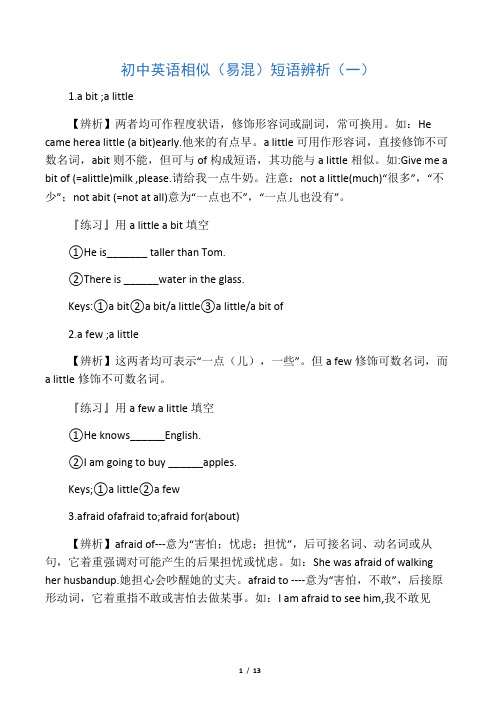
初中英语相似(易混)短语辨析(一)1.a bit ;a little【辨析】两者均可作程度状语,修饰形容词或副词,常可换用。
如:He came herea little (a bit)early.他来的有点早。
a little可用作形容词,直接修饰不可数名词,abit则不能,但可与of构成短语,其功能与a little相似。
如:Give me a bit of (=alittle)milk ,please.请给我一点牛奶。
注意:not a little(much)“很多”,“不少”;not abit (=not at all)意为“一点也不”,“一点儿也没有”。
『练习』用a little a bit填空①He is_______ taller than Tom.②There is ______water in the glass.Keys:①a bit②a bit/a little③a little/a bit of2.a few ;a little【辨析】这两者均可表示“一点(儿),一些”。
但a few修饰可数名词,而a little修饰不可数名词。
『练习』用a few a little填空①He knows______English.②I am going to buy ______apples.Keys;①a little②a few3.afraid ofafraid to;afraid for(about)【辨析】afraid of---意为“害怕;忧虑;担忧”,后可接名词、动名词或从句,它着重强调对可能产生的后果担忧或忧虑。
如:She was afraid of walking her husbandup.她担心会吵醒她的丈夫。
afraid to ----意为“害怕,不敢”,后接原形动词,它着重指不敢或害怕去做某事。
如:I am afraid to see him,我不敢见他。
afraid for (about)意为“替某人(事)担心”,其后接人或事。
词义辨析-agreewithagreetoagreeon
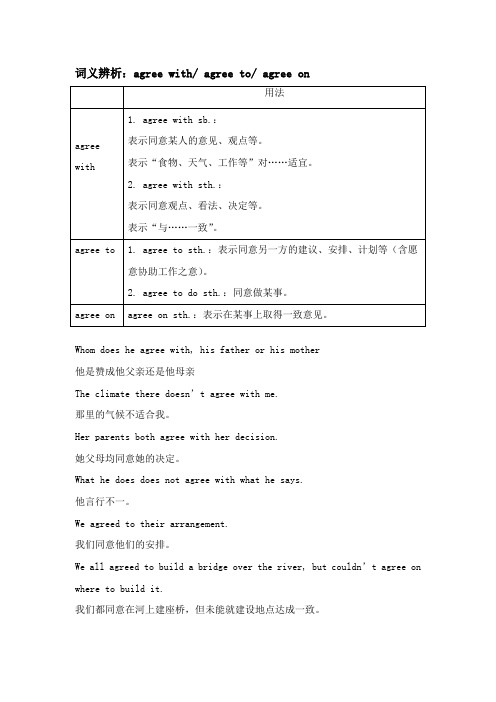
词义辨析:agree with/ agree to/ agree onWhom does he agree with, his father or his mother他是赞成他父亲还是他母亲The climate there doesn’t agree with me.那里的气候不适合我。
Her parents both agree with her decision.她父母均同意她的决定。
What he does does not agree with what he says.他言行不一。
We agreed to their arrangement.我们同意他们的安排。
We all agreed to build a bridge over the river, but couldn’t agree on where to build it.我们都同意在河上建座桥,但未能就建设地点达成一致。
练习:1. After a discussion, the two sides finally each other.A.agreed atB.agreed onC.agreed withD.agreed to2. This kind of work doesn't me, so I don't his plan.A.agree to; agree toB.agree with; agree toC.agree with; agree withD.agree on; agree to3. She agreed us, so we agreed the project atlast.A.to; withB.with; inC.with; onD.to; on4. — I think London is the best place for us.— I don't agree your opinion, for the climate there doesn't agree us.A.to; toB.to; withC.with; withD.with; to5. What they have heard doesn’t _____ the fact.A. agree onB. agree withC. agree toD. agreeat词义辨析:except/except for/except that/but/besides/apartfromEveryone attended the meeting but/except Mary.大家都出席了这次会议,但玛丽不在其列。
初中英语考试必考重点词语辨析汇总
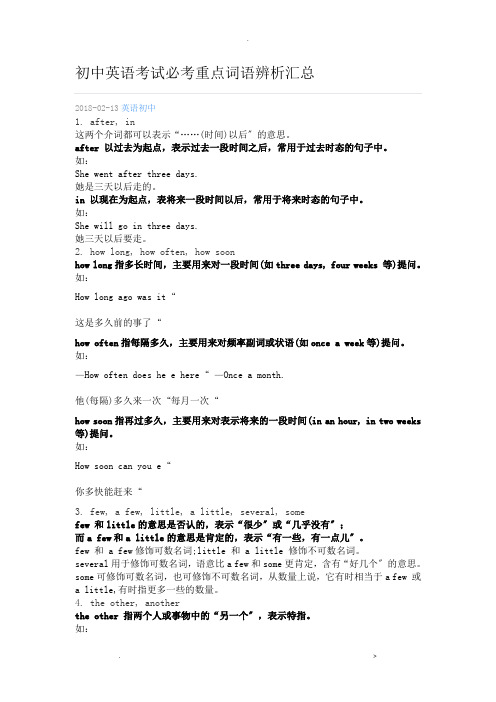
初中英语考试必考重点词语辨析汇总2018-02-13英语初中1. after, in这两个介词都可以表示“……(时间)以后〞的意思。
after 以过去为起点,表示过去一段时间之后,常用于过去时态的句子中。
如:She went after three days.她是三天以后走的。
in 以现在为起点,表将来一段时间以后,常用于将来时态的句子中。
如:She will go in three days.她三天以后要走。
2. how long, how often, how soonhow long指多长时间,主要用来对一段时间(如three days, four weeks 等)提问。
如:How long ago was it“这是多久前的事了“how often指每隔多久,主要用来对频率副词或状语(如once a week等)提问。
如:—How often does he e here“—Once a month.他(每隔)多久来一次“每月一次“how soon指再过多久,主要用来对表示将来的一段时间(in an hour, in two weeks 等)提问。
如:How soon can you e“你多快能赶来“3. few, a few, little, a little, several, somefew 和little的意思是否认的,表示“很少〞或“几乎没有〞;而a few和a little的意思是肯定的,表示“有一些,有一点儿〞。
few 和 a few修饰可数名词;little 和 a little 修饰不可数名词。
several用于修饰可数名词,语意比a few和some更肯定,含有“好几个〞的意思。
some可修饰可数名词,也可修饰不可数名词,从数量上说,它有时相当于a few 或a little,有时指更多一些的数量。
4. the other, anotherthe other 指两个人或事物中的“另一个〞,表示特指。
考研英语词汇:agree的中文解析.doc
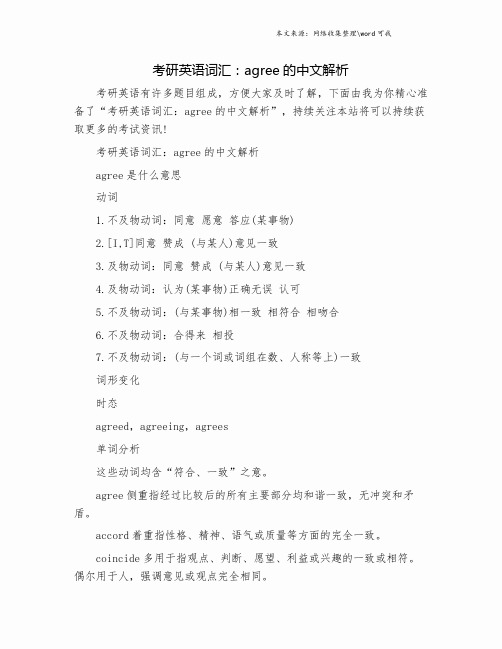
考研英语词汇:agree的中文解析考研英语有许多题目组成,方便大家及时了解,下面由我为你精心准备了“考研英语词汇:agree的中文解析”,持续关注本站将可以持续获取更多的考试资讯!考研英语词汇:agree的中文解析agree是什么意思动词1.不及物动词:同意愿意答应(某事物)2.[I,T]同意赞成 (与某人)意见一致3.及物动词:同意赞成 (与某人)意见一致4.及物动词:认为(某事物)正确无误认可5.不及物动词:(与某事物)相一致相符合相吻合6.不及物动词:合得来相投7.不及物动词:(与一个词或词组在数、人称等上)一致词形变化时态agreed,agreeing,agrees单词分析这些动词均含“符合、一致”之意。
agree侧重指经过比较后的所有主要部分均和谐一致,无冲突和矛盾。
accord着重指性格、精神、语气或质量等方面的完全一致。
coincide多用于指观点、判断、愿望、利益或兴趣的一致或相符。
偶尔用于人,强调意见或观点完全相同。
conform强调在形状、性格以及主要特点等方面的相似或一致。
correspond指在进行比较时,两个事物在某一个重要方面或细节上互相匹配、一致。
这些动词均含“同意、赞同”之意。
agree普通用词,侧重指对某事同其他人有相同的意见或想法。
consent指同意别人的请求、建议或满足他人的愿望,着重意愿或感情,常和to连用。
approve侧重对认为正确或满意的事表示赞同或批准。
作不及物动词用时,常与of连用。
comply指答应某人已经提出或可能要求做的某事,与with连用。
subscribe指完全地赞成已阐明的立场。
多用于比较愿意支持一种立场或为一种立场所辩护的情况。
英语解释go togetherbe compatible, similar or consistent coincide in their characteristicsbe in accord be in agreementshow grammatical agreementachieve harmony of opinion, feeling, or purposebe agreeable or suitableconsent or assent to a condition, or agree to do something 例句The class had an agreement not to sneak on each other to the teacher.全班学生达成协议,不向教师互相告发。
语法技巧介词短语的常见错误及纠正方法
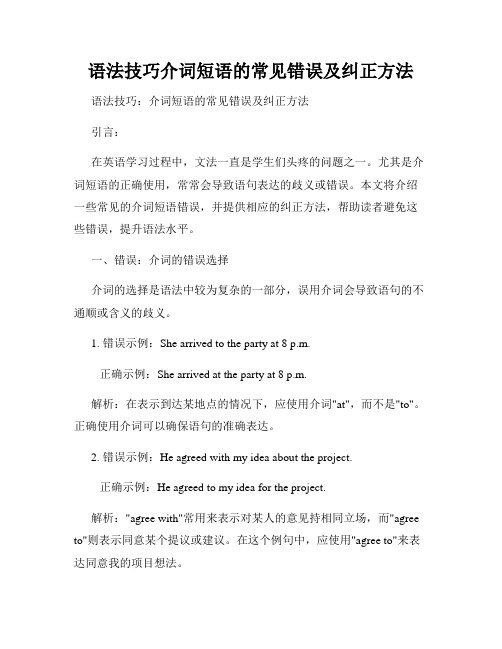
语法技巧介词短语的常见错误及纠正方法语法技巧:介词短语的常见错误及纠正方法引言:在英语学习过程中,文法一直是学生们头疼的问题之一。
尤其是介词短语的正确使用,常常会导致语句表达的歧义或错误。
本文将介绍一些常见的介词短语错误,并提供相应的纠正方法,帮助读者避免这些错误,提升语法水平。
一、错误:介词的错误选择介词的选择是语法中较为复杂的一部分,误用介词会导致语句的不通顺或含义的歧义。
1. 错误示例:She arrived to the party at 8 p.m.正确示例:She arrived at the party at 8 p.m.解析:在表示到达某地点的情况下,应使用介词"at",而不是"to"。
正确使用介词可以确保语句的准确表达。
2. 错误示例:He agreed with my idea about the project.正确示例:He agreed to my idea for the project.解析:"agree with"常用来表示对某人的意见持相同立场,而"agree to"则表示同意某个提议或建议。
在这个例句中,应使用"agree to"来表达同意我的项目想法。
纠正方法:积累常见介词的正确搭配用法,并注意对不同场景中不同介词的使用区别,可以通过阅读、练习和背诵例句来提高对介词的掌握。
二、错误:缺少介词有时,我们在句子中缺少了必要的介词,导致句子不完整或含义不清。
1. 错误示例:She put the book the shelf.正确示例:She put the book on the shelf.解析:在表示将物品放置到某个地方时,应该使用介词"on"来表达物体与地点的关系。
2. 错误示例:I'm interested video games.正确示例:I'm interested in video games.解析:表示对某物感兴趣时,应使用介词"in",即"be interested in"。
agree with agree on和agree to的区别
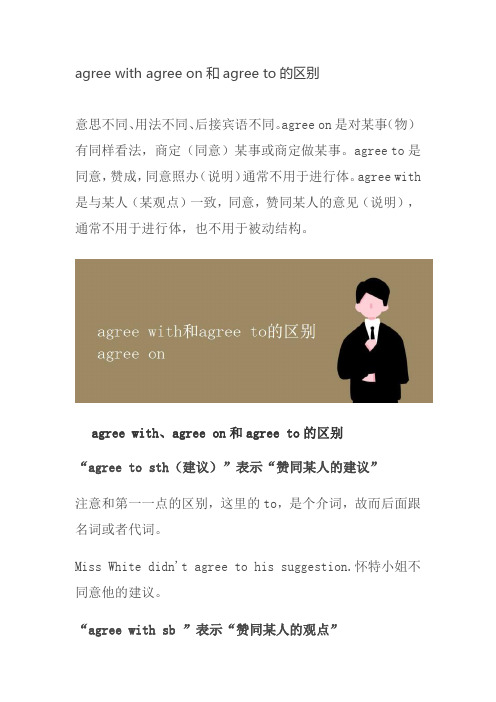
agree with agree on和agree to的区别
意思不同、用法不同、后接宾语不同。
agree on是对某事(物)有同样看法,商定(同意)某事或商定做某事。
agree to是同意,赞成,同意照办(说明)通常不用于进行体。
agree with 是与某人(某观点)一致,同意,赞同某人的意见(说明),通常不用于进行体,也不用于被动结构。
agree with、agree on和agree to的区别
“agree to sth(建议)”表示“赞同某人的建议”
注意和第一一点的区别,这里的to,是个介词,故而后面跟名词或者代词。
Miss White didn't agree to his suggestion.怀特小姐不同意他的建议。
“agree with sb ”表示“赞同某人的观点”
注意with后跟人,表示赞同某人的看法。
agree后面跟to 和with的用法是初中英语必考的一个知识点,记住介词to 后面是“事”;介词with后面是“人”。
I don't agree with you.你的看法,我不敢苟同。
Gentlemen get along with others;but do not necessarily agree with them.君子和而不同。
“agree on sth(决定)”表示“赞成某人的决定”
We all agreed on his decision.我妹妹都同意了他的决定。
agree with,agree to,agree on的重点用法及其区别
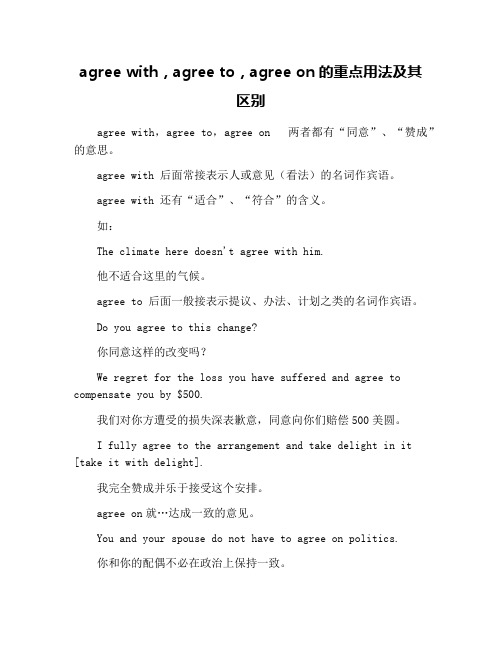
agree with,agree to,agree on的重点用法及其区别agree with,agree to,agree on 两者都有“同意”、“赞成”的意思。
agree with 后面常接表示人或意见(看法)的名词作宾语。
agree with 还有“适合”、“符合”的含义。
如:The climate here doesn't agree with him.他不适合这里的气候。
agree to 后面一般接表示提议、办法、计划之类的名词作宾语。
Do you agree to this change?你同意这样的改变吗?We regret for the loss you have suffered and agree to compensate you by $500.我们对你方遭受的损失深表歉意,同意向你们赔偿500美圆。
I fully agree to the arrangement and take delight in it [take it with delight].我完全赞成并乐于接受这个安排。
agree on就…达成一致的意见。
You and your spouse do not have to agree on politics.你和你的配偶不必在政治上保持一致。
Agree on how we measure/test the achievement of the needs and goals.在他们如何度量/测试需求和目标的达成方面达成一致。
And where is the point in stoking up fear of China if Americans cannot agree on what to do about it?并且,如果美国人都无法在采取什么行动上取得一致,那么鼓动对中国的害怕又有什么意义?。
活跃动词搭配
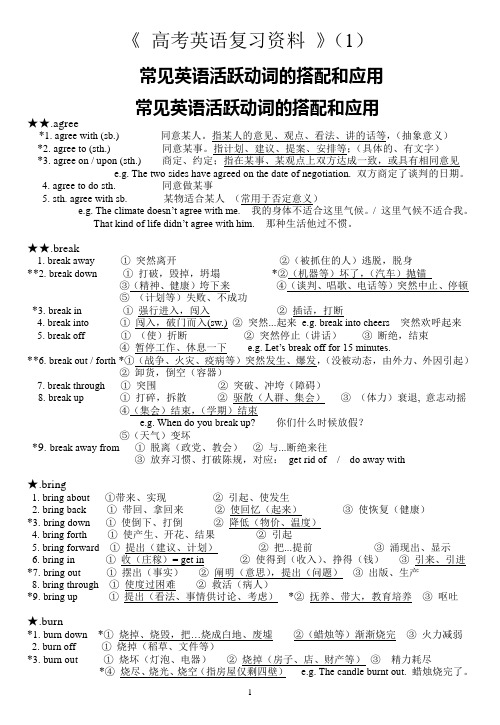
《高考英语复习资料》(1)常见英语活跃动词的搭配和应用常见英语活跃动词的搭配和应用★★.agree*1. agree with (sb.) 同意某人。
指某人的意见、观点、看法、讲的话等,(抽象意义)*2. agree to (sth.) 同意某事。
指计划、建议、提案、安排等;(具体的、有文字)*3. agree on / upon (sth.) 商定、约定;指在某事、某观点上双方达成一致,或具有相同意见e.g. The two sides have agreed on the date of negotiation. 双方商定了谈判的日期。
4. agree to do sth. 同意做某事5. sth. agree with sb. 某物适合某人(常用于否定意义)e.g. The climate doesn’t agree with me.我的身体不适合这里气候。
/ 这里气候不适合我。
That kind o f life didn’t agree with him. 那种生活他过不惯。
★★.break1. break away ①突然离开②(被抓住的人)逃脱,脱身**2. break down ①打破,毁掉,坍塌*②(机器等)坏了,(汽车)抛锚③(精神、健康)垮下来④(谈判、唱歌、电话等)突然中止、停顿⑤(计划等)失败、不成功*3. break in ①强行进入,闯入②插话,打断4. break into ①闯入,破门而入(sw.) ②突然...起来e.g. break into cheers 突然欢呼起来5. break off ①(使)折断②突然停止(讲话)③断绝,结束④暂停工作、休息一下 e.g. Let’s break off for 15 minutes.**6. break out / forth *①(战争、火灾、疫病等)突然发生、爆发,(没被动态,由外力、外因引起)②卸货,倒空(容器)7. break through ①突围②突破、冲垮(障碍)8. break up ①打碎,拆散②驱散(人群、集会)③(体力)衰退, 意志动摇④(集会)结束,(学期)结束e.g. When do you break up? 你们什么时候放假?⑤(天气)变坏*9. break away from ①脱离(政党、教会)②与...断绝来往③放弃习惯、打破陈规,对应:get rid of / do away with★.bring1. bring about ①带来、实现②引起、使发生2. bring back ①带回、拿回来②使回忆(起来)③使恢复(健康)*3. bring down ①使倒下、打倒②降低(物价、温度)4. bring forth ①使产生、开花、结果②引起5. bring forward ①提出(建议、计划)②把...提前③涌现出、显示6. bring in ①收(庄稼)= get in ②使得到(收入)、挣得(钱)③引来、引进*7. bring out ①摆出(事实)②阐明(意思),提出(问题)③出版、生产8. bring through ①使度过困难②救活(病人)*9. bring up ①提出(看法、事情供讨论、考虑)*②抚养、带大,教育培养③呕吐★.burn*1. burn down *①烧掉、烧毁,把…烧成白地、废墟②(蜡烛等)渐渐烧完③火力减弱2. burn off ①烧掉(稻草、文件等)*3. burn out ①烧坏(灯泡、电器)②烧掉(房子、店、财产等)③精力耗尽*④烧尽、烧光、烧空(指房屋仅剩四壁) e.g. The candle burnt out. 蜡烛烧完了。
- 1、下载文档前请自行甄别文档内容的完整性,平台不提供额外的编辑、内容补充、找答案等附加服务。
- 2、"仅部分预览"的文档,不可在线预览部分如存在完整性等问题,可反馈申请退款(可完整预览的文档不适用该条件!)。
- 3、如文档侵犯您的权益,请联系客服反馈,我们会尽快为您处理(人工客服工作时间:9:00-18:30)。
agree with,agree to,agree on的区别
1. agree with用于以下用法:
①表示同意某人或某人的想法(即持同一观点),后面常接sb和what引导的句子:
I don’t agree with you. 我不同意你的意见。
I agree with what you say. 我同意你说的。
②表示“ (食物、天气、工作等)对…适宜”:
The dampness of the forest did not agree with him physically. 他的身体不能适应森林的潮湿。
I dont think the food here agrees with me.
我觉得这里的食物不对我的胃口。
③表示“与…一致”:
What he does does not agree with what he says. 他言行不一致。
2. agree to
①主要用来表示一方提出一项建议、安排、计划等,另一方同意协作:
They had little choice but to agree to his suggestion.
他们别无选择,只好接受他的提议。
Is he going to agree to our plan? 他会同意我们的计划吗?
②其后既可接动词原形(此时to是不定式符号),也可
接动名词(一般有逻辑主语,此时to是介词):
He agreed to go with us. 他同意和我们一起去。
I never agreed to lucy marrying him. 我从来没同意露西嫁给他。
3. agree on [upon]
主要指双方通过协商而取得一致意见或达成协议:
We agreed on the price. 我们就价格达成了一致意见。
Both sides agreed on these terms. 双方都同意这些条件。
注意:agree 不能接不定式的复合结构,所以汉语的“同意某人做某事”,不能直译为agree sb to do sth, 而应根据情况改用其它结构:
他们同意我去。
正:They agreed to let me go.
正:They agreed to my going.
误:They agreed me to go.。
